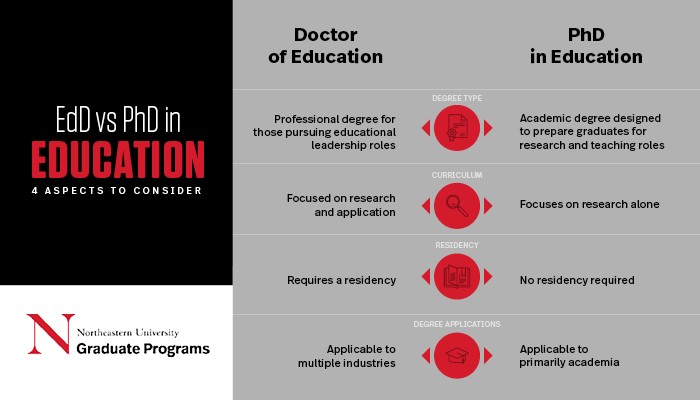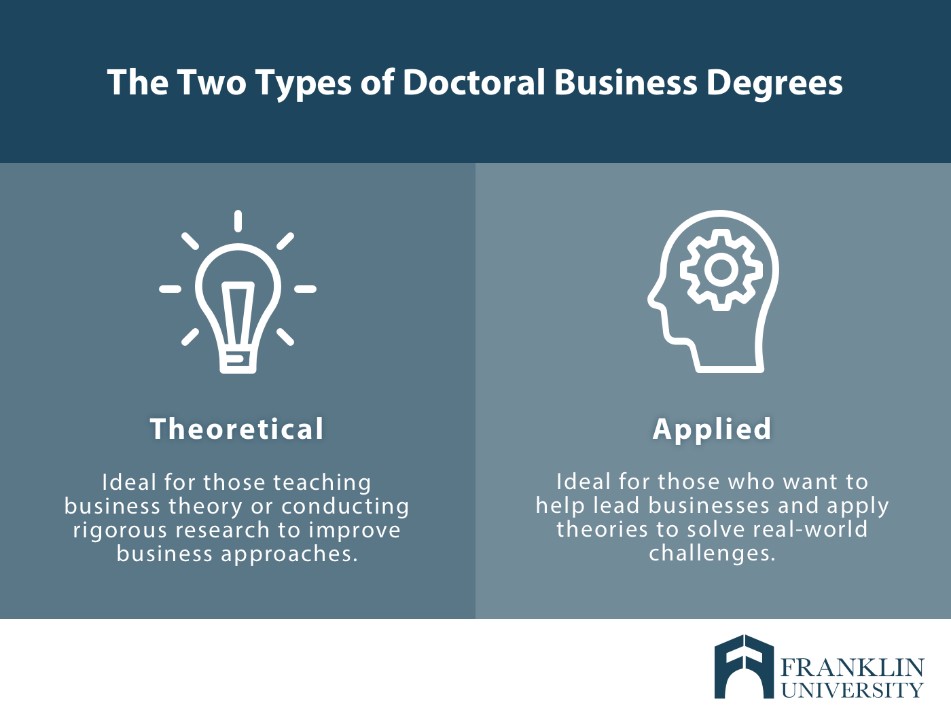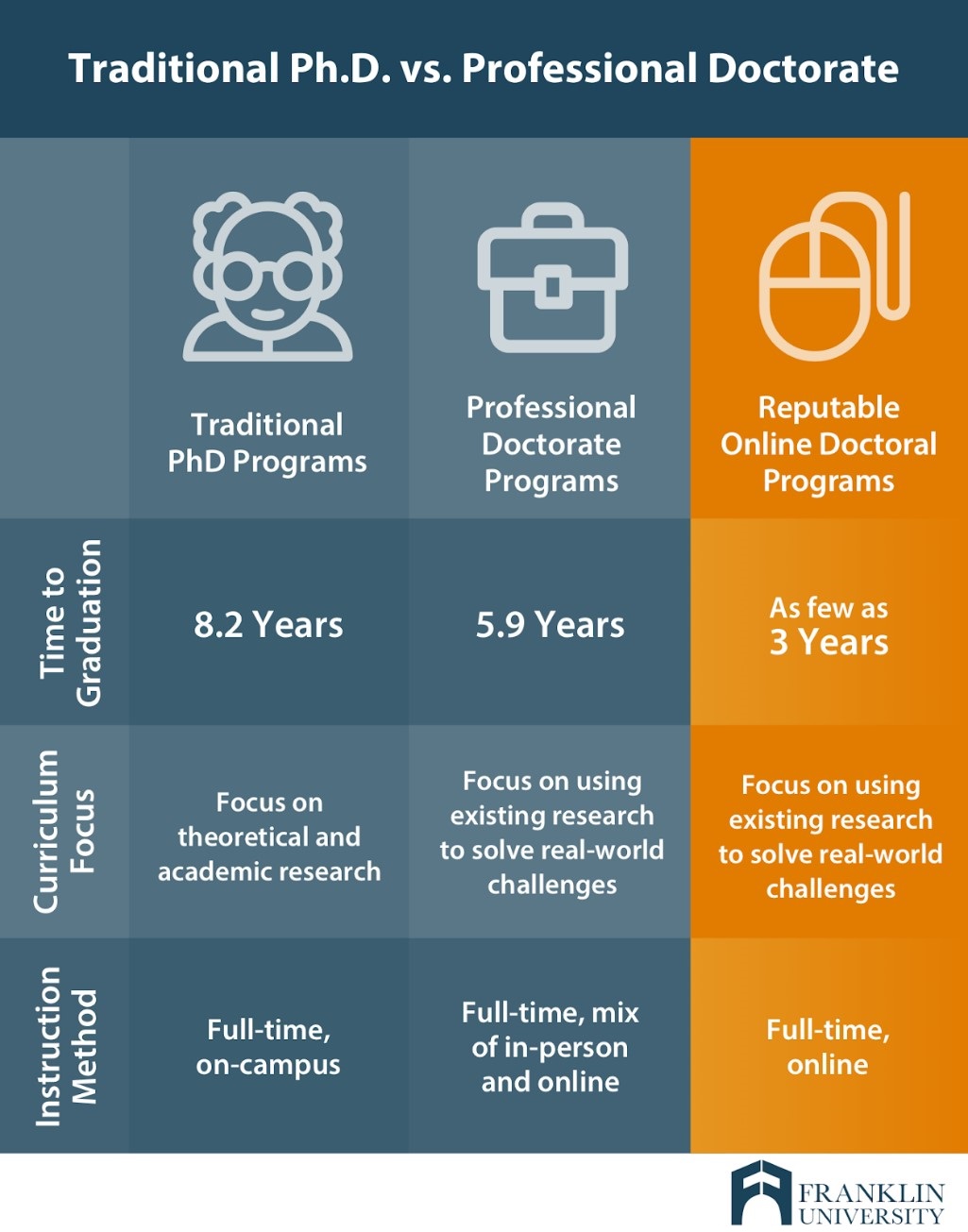
Decoding the Differences: PhD in Education Vs Professional Doctorate in Education
So, you are in a dilemma on what’s the difference between a Professional Doctorate (PD) and a Ph.D. (Doctors of Philosophy)?
On top of that you might have heard the term Professional Doctorate in education. But did you know you can achieve your Doctorate degree online in lesser time?
We know you’re curious now!
Well, you’re not alone in this, the majority of people have this question on their minds and today you will get all the answers related to this topic. All professionals aspire to advance their careers and pursue higher education. Pursuing a doctorate is one of the most popular ways to achieve that goal. However, different types of doctorate programs are available and it can be challenging to understand the differences between a PHD and PD.
Ph.D. and PD programs are both advanced programs that are pursued by individuals who are looking to further their education and career prospects. While both programs are similar in many ways, they also have a number of major differences that are important to understand before deciding which program to pursue.
In this blog post, first, we will take an in-depth look at the differences between traditional Ph.D. and PD programs, including their eligibility criteria, duration, coursework, research opportunities, thesis/dissertation requirements, and career prospects.
Secondly, we will get to know everything about Ph.D. and Professional doctorate in education and-
Lastly, we will be focusing on an online professional doctorate in education program. By the end of this blog post, you will have a better understanding of these two programs and be able to make an informed decision about which program is right for you.
So, let’s dive in to our topic…
History of PD Programs
Professional Doctorate (PD) programs are relatively new in the academic world. The first professional doctorate programs were introduced in Europe in the early 19th century, and they became more popular in major countries in the 1950s. These programs were designed to provide scholars with the opportunity to conduct advanced research and contribute to their field of study.
PD programs are geared toward individuals who have already attained their doctorate titles. The purpose of a professional doctorate program is to provide scholars with the opportunity to gain additional knowledge and experience in their field of study.
History of Ph.D. Programs
Ph.D. programs date back to the Middle Ages in Europe, where they were introduced as a way to train scholars in theology, law, and medicine. Since then, Ph.D. programs have expanded to cover numerous academic fields.
The first person to enroll in the Ph.D. program offered by the University of London in 1919 was Shanti Swarup Bhatnagar, who also became the first recipient of a Ph.D. in Chemistry from the University in the year 1921.
Ph.D. programs typically take four to five years to complete and require students to complete original research and defend a dissertation. The purpose of a Ph.D. program is to train scholars to become experts in their field of study and contribute to the advancement of human knowledge.
What is a Professional Doctorate?
A professional doctorate is the highest level of academic milestone that you can earn. It is a general term that encompasses a range of title, including a Doctor of Education (EdD), Doctor of Business Administration (DBA), and Doctor of Medicine (MD). To earn a doctorate title, one must complete a program of study that typically takes between four and five years. In most cases, students are required to complete coursework, research, and defend a thesis.
What is a Ph.D.?
A Ph.D. or Doctor of Philosophy, is a specific type of doctorate that is focused on research and scholarship. Unlike other doctorates, a Ph.D. is primarily research-based. It typically takes between five and seven years to complete and involves coursework, research, and the completion of a dissertation that contributes original research to the field. In some fields, such as the sciences, a Ph.D. may require laboratory work and the publication of research articles.
Understanding the Key Differences between Ph.D. and PD Programs
One of the main differences between Ph.D. and PD program is their focus. Ph.D. programs are typically focused on research and academia, while PD programs can be either academic or professional. This means that Ph.D. programs are designed to prepare students for careers in research, teaching, and academia, while PD programs are designed to prepare students for careers in industry, government, or other professional settings.
Another key difference between Ph.D. and PD program is their level of specialization. Ph.D. programs tend to be more specialized with students focusing on a specific area of research within their field. PD programs, on the other hand, tend to be more broad-based, with students developing a wide range of skills and knowledge that can be applied to a variety of professional settings practically.
Similarities Between a Professional Doctorate and a Ph.D.
Despite the differences between a Doctorate and a Ph.D., there are some similarities between the two as well. Both are the highest level of academic achievement in a particular field. They also require a significant amount of time and dedication to complete, often involving several years of coursework, research, and writing. Additionally, both can lead to career opportunities in academia, research, government, and industry.
Benefits of a Professional Doctorate
There are numerous benefits to earning a professional doctorate, regardless of the specific title earned. One major benefit is the huge potential for career advancement. Many high-level positions in academia, research, and industry require a doctorate. Additionally, those who hold doctorate titles are usually highly respected and recognized experts in their field.
Another benefit is the opportunity to contribute to the field through research. Doctorate students have the opportunity to pursue original research and make significant contributions to their field.
Benefits of a Ph.D.
While all doctorate title has benefits, a Ph.D. offers some unique advantages. One major benefit is the opportunity to become an expert in a particular field. Ph.D. students are able to dive deep into a specific area of study and develop a deep understanding of the subject matter.
Another benefit is the opportunity to contribute original research to the field. Ph.D. students are expected to make significant contributions to their field through their dissertations, which can lead to new knowledge and advancements in the field.
Eligibility Criteria for Ph.D. and PD programs
The eligibility criteria for Ph.D. and PD programs can vary depending on the institution and the specific program. Generally speaking, Ph.D. programs require applicants to have a master's in a related field, as well as a strong academic record and research experience. PD programs, on the other hand, may require applicants to have a bachelor's or master's in a related field, as well as relevant work experience and professional qualifications.
Duration of Ph.D. and PD programs
Ph.D. programs typically take longer to complete than PD programs. A typical PhD program can take anywhere from four to six years to complete, depending on the field of study and the specific requirements of the program. PD programs, on the other hand, are generally shorter, taking anywhere from one to three years to complete.
Coursework in Ph.D. and PD Programs
Both Ph.D. and PD programs require coursework as part of their curriculum. However, the amount and type of coursework required can vary significantly between programs. Ph.D. programs typically require more coursework than PD programs, with students taking a variety of advanced courses in their field of study. PD programs, on the other hand, may require less coursework, with students focusing more on practical training and professional development.

Research Opportunities in Ph.D. and PD Programs
Research is a key component of both Ph.D. and PD programs. However, the focus and scope of research can differ between the two programs. Ph.D. programs typically require students to conduct original research that contributes to the field of study, while PD programs may focus more on applied research that addresses real-world problems and challenges.
Thesis/Dissertation Requirements in Ph.D. and PD Programs
Both Ph.D. and PD programs require students to complete a thesis or dissertation as part of their program requirements. However, the scope and focus of these projects can differ significantly between programs. Ph.D. students are typically required to conduct original research that contributes to the knowledge base of their field, while PD students may be required to complete a project or report that addresses a specific problem or challenge in their professional field.
Career Prospects With PD
Both Ph.D. and PD programs can lead to a wide range of lucrative career opportunities. Ph.D. graduates often pursue careers in academia, research, or consulting, while PD graduates may work in industry, government, or other professional settings. The specific career prospects and opportunities available will depend on the individual's field of study, level of specialization, and professional experience.
High-paying careers that require a Doctorate title –
- Professor
- Anthropologist
- Administrator
- Linguist
- Historian
- Academic Dean
- Statistician
- Research Scientist
- Cultural and Linguistic Preservationist
- Educational Leader
- Healthcare Information Manager
- Adult and Continuous Education Trainer
- Educational Assessment, Testing, and Measurement Specialist
- College President
- Chief Learning Officer
- Provost
- School Superintendent
- Elementary, Middle, and High School Principal
- Executive Director of Education
And many more…
Career Options With Ph.D.
Individuals who have obtained a Ph.D. have numerous career options available to them. Many Ph.D. graduates pursue academic careers, such as becoming professors or researchers at universities. However, Ph.D. graduates can also pursue careers in government, industry, and non-profit organizations.
Ph.D. graduates are highly sought after by employers due to their expertise and knowledge in their field. The skills that Ph.D. graduates possess, such as critical thinking, problem-solving, and research skills, are highly valued in many industries. Individuals who have obtained a PD title also have numerous career options available to them.
PhD graduates often pursue academic careers, such as becoming professors or researchers at universities. However, PD graduates can also pursue careers in government, industry, and non-profit organizations. PD graduates have additional experience and knowledge in their field, which can make them more competitive in the job market.
Doctorate vs Ph.D. - Salary Comparison (Generic)
While earning a Doctorate or Ph.D. can lead to many career opportunities, it is important to consider the potential salary that can be earned with each title.
According to the Bureau of Labor Statistics, the median annual wage for those with a doctorate was around $97,000 in 2020. However, this varies widely based on the specific field and career chosen.
Can a Ph.D. be Called a Doctor?
Yes, individuals who have obtained a Ph.D. can be called "Doctor." The title "Doctor" is typically used in academic settings, such as when addressing professors or researchers. However, the title "Doctor" can also be used in other settings, such as when addressing individuals who have obtained professional doctorates, such as medical doctors or lawyers.
Now, we have known everything about Post Doctorate and Ph.D., it’s time to know about Doctorate in Education and Ph.D. in Education and how they differ from traditional PD and Ph.D.
What is Professional Doctorate in Education?
A professional doctorate in education is a program designed for professionals who want to advance their careers in education. This program is focused on the practical application of knowledge and skills and prepares students for leadership roles in education. Professional doctorates in education are typically designed for working professionals who want to continue their education while continuing to work.
Professional doctorate programs in education typically take between four and six years to complete. During this time, students take coursework in leadership, organizational development, and policy analysis. They also participate in practical projects and work closely with faculty to develop their leadership skills.
What is Ph.D. in Education?
A Ph.D. in Education is a research-focused program that prepares students for careers in academia and research. This program is designed to provide students with advanced skills and knowledge in research methods, data analysis, and theoretical frameworks. Students are required to complete original research in their field of study, which is then presented in a dissertation. Ph.D. programs in education typically take between four and seven years to complete. During this time, students take coursework in research methods, data analysis, and theoretical frameworks. They also participate in research projects and work closely with faculty to develop their research skills.
Difference between Professional Doctorate in Education and Ph.D. in Education
i. Professional Doctorate in Education program is for those who are looking to make a career related to educational and leadership roles. Whereas, Ph.D. in education program is for those who want to make a career related to research and teaching roles.
ii. Professional Doctorate in Education focuses on research and application. Whereas, Ph.D. in Education focuses on research alone.
iii. Professional Doctorate in Education requires residency. While, Ph.D. in Education doesn’t need residency.
iv. Professional Doctorate in Education applicable to various industries. Whereas, Ph.D. in Education is applicable to academia only.

A Professional Doctorate in Education (PD) is a practice-focused program that prepares students to apply research findings to practice in the field of education. The program is designed to equip students with the skills and knowledge necessary to lead and innovate in the field of education.
A PD program typically requires students to complete coursework in a particular field and then apply that knowledge to real-world problems. In other words, a Professional Doctorate in Education is a specialized program that focuses on the application of research findings to practice in the field of education, while a PD is a generalist program that can be applied to any field.
Another important difference between a PD in Education and a PhD in Education is the length of the program. A PD in Education typically takes 3-4 years to complete, while a PhD in Education can take anywhere from 3-5 years to complete depending on the field of study.
Another difference between a Ph.D. and a Professional Doctorate in Education is the focus of the program. A Ph.D. is research-focused and prepares students for careers in academia and research. A Professional Doctorate, on the other hand, is focused on the practical application of knowledge and skills and prepares students for leadership roles in education.
Finally, the type of research required in each program is different. In a Ph.D. program, students are required to complete original research in their field of study, which is then presented in a dissertation. In a Professional Doctorate program, students are required to complete practical projects that demonstrate their knowledge and skills in leadership and organizational development.
Benefits of Pursuing a Professional Doctorate in Education
Pursuing a Doctorate in Education can be a challenging but a rewarding experience. Some of the benefits of pursuing a Doctorate in Education include -
i. Advancing your career: A Doctorate in Education can help you advance your career and take on leadership roles in education.
ii. Contributing to the field of education: A Doctorate in Education provides you with the skills and knowledge to contribute to the field of education through research or the practical application of knowledge and skills.
iii. Personal growth: Pursuing a Doctorate in Education can be a transformative experience that challenges you to grow personally and professionally.

Benefits of Pursuing a Ph.D. in Education
There are several benefits to pursuing a Ph.D. in education, including
i. Advancing your career in academia: A Ph.D. in Education can open up opportunities for careers in academia and research.
ii. Contributing to the field of education: A Ph.D. in Education provides you with the skills and knowledge to contribute to the field of education through research and scholarship.
iii. Personal growth: Pursuing a Ph.D. in Education can be a transformative experience that challenges you to grow personally and professionally.
Things to Keep in Mind while Pursuing Ph.D. in Education
If you are considering pursuing a Ph.D. in education, there are several things to keep in mind.
i. First and foremost, you should have a clear understanding of your research interests and how they align with the research being conducted in the field of education.
ii. You should be prepared for the time commitment and rigor of a Ph.D. program. Ph.D. programs in education require a significant amount of time and effort, including coursework, research, and writing. It is important to be prepared for the workload and to have a support system in place to help you manage your time and stay on track.
iii. You should consider the career opportunities available to Ph.D. graduates in education. While a Ph.D. in Education can lead to a career in academia, there are also opportunities in research, policy, and consulting.
The Future of Getting a PhD or PD in Education Programs
As time is passing day by day, there’s increased use of technology and the internet. The traditional path to a Ph.D. or PD completing a doctoral program at a university is no longer the only option available.
There are now many alternative paths to a Ph.D. or Doctorate in Education, including online programs, accelerated programs, and executive programs. These alternative paths are often more flexible and less expensive than traditional programs we provide online Professional Doctorate in Education program, which gives you the liberty to achieve the Doctorate from anywhere in the world at your own flexible time. Before the boom of the internet industry, this was not at all possible, this has only become possible because of the continuous growth of the internet.
Online Professional Doctorate in Education Program
Online professional Doctorate in Education program is becoming increasingly popular, with many universities and colleges now offering online options. These programs allow students to complete coursework from anywhere, at any time. Online programs typically offer more flexibility than traditional programs, allowing students to balance their education with work and other commitments.
Online programs also offer a wider range of courses and resources than traditional programs, as students can access materials from universities all over the world. Additionally, online programs can be more affordable than traditional programs, as there are no costs associated with commuting or living on campus.
Differences Between Online and Traditional Professional Doctorate in Education
One of the main differences between an online and traditional professional Doctorate in Education program is the mode of delivery. Traditional programs require students to attend classes on campus, while online programs allow students to complete coursework from anywhere with an internet connection.
Another difference is the level of interaction with faculty and peers. In traditional programs, students have the opportunity to engage in face-to-face discussions and debates, while online programs rely more on virtual communication such as email and discussion forums.
Finally, online programs may offer more flexibility in terms of scheduling and pacing. Students can complete coursework at their own pace and on their own schedule, while traditional programs may require students to attend classes at specific times and follow a set schedule.

Benefits of Earning an Online Professional Doctorate in Education
There are many benefits to earning an online professional Doctorate in Education.
i. One of the main benefits is flexibility. Online programs allow students to balance their education with other commitments such as work and family. Additionally, online programs often offer a wider range of courses and resources than traditional programs.
ii. Another benefit of an online program is the ability to network with professionals from all over the world. Online programs often attract students from diverse backgrounds and geographic locations, providing an opportunity for students to collaborate and share ideas with individuals they may not have met otherwise.
iii. Finally, online programs can be more affordable than traditional programs. Students in online programs do not have to pay for commuting or living on campus, and many online programs offer lower tuition rates than traditional programs.
Conclusion: Which Program is Right for You?
Deciding between an online professional doctorate in education program and a traditional program is not a difficult decision to take. Ultimately, the decision is depended on your individual needs and preferences.
If you value face-to-face interaction with faculty and peers and have the flexibility to attend classes on campus, a traditional program may be the best fit for you.
If you value flexibility and affordability, and can’t afford to give long years which a traditional Doctorate in Education then an online Professional Doctorate program may be the best fit. No matter which program you choose, it is important to ensure that the program is accredited and meets your educational and career goals. With the right program, you can advance your education and take your career in education to the next level.
In the end, we wish you all the very best in your career journey!!!

